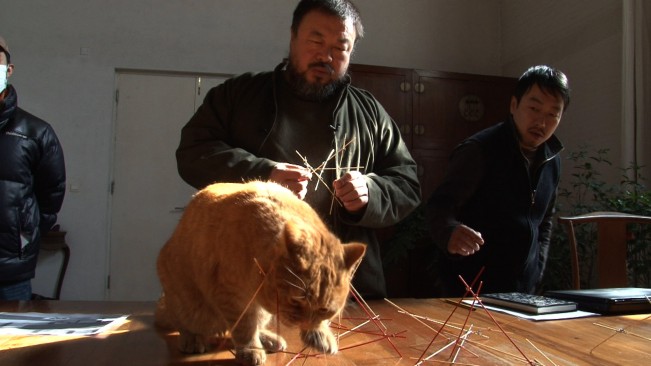

By Mike Wilmington Wilmington@moviecitynews.com
Wilmington on DVDs: Ai Weiwei: Never Sorry
PICK OF THE WEEK: NEW
AI WEIWEI: NEVER SORRY (Also Blu-ray) (Three and a Half Stars)
U.S.: Alison Klayman, 2011 (IFC-MPI-Sundance Selects)
Ai Weiwei, the Chinese conceptual artist and subject of Alison Klayman‘s documentary Ai Weiwei: Never Sorry is a heavy-set guy, with a frizzy mustache, goatee and beard, who has 40 cats and a taste for Carnegie Deli pastrami sandwiches, developed when he lived in New York City. Now back in China, he blogs and tweets all the time and is probably, right now, the word’s most famous living artist — as well as the winner of a Nobel Peace prize for his brave and outspoken activism and protests against the Chinese government and its anti-democratic policies, Many would argue that he’s also the best living artist, or one of them, or, according to ArtReview. “the most powerful artist in the world.“
Really? I don’t want to come across like an uptight philistine or a bourgeois simpleton, but the one thing this movie didn’t convince me about was the stature of Ai Weiwei’s art—which may be either my fault, or the film’s, or possibly Ai Weiwei‘s. In any case, as Klayman follows her subject around, exhaustively and sympathetically, from 2008 to 2011, we see a lot of his political activity but we don’t actually see much of Ai’s art. Some of what we do see is being executed by other people, his associates, according to his instructions.
The most famous Ai work we see is a model for the 2008 Chinese Olympics Bird‘s Nest Stadium, which was co-planned with two Swiss architects. The most perplexing is a huge gallery installation for London‘s Tate Modern. consisting of a floor allegedly covered with 100 million sunflower seeds. (Manohla Dargis of the New York Times describes them as handmade porcelain seeds.) It’s called ‘Sunflower Seeds.” Another installation in Munich, is said to be composed of 9,000 backpacks. One of his more amusing projects invole a series of self-shot snapshots where he gives the finger to a variety of famous landmarks. Anyway, I wasn’t impressed by the seeds. Or by the concept. But then I’m not impressed with very much conceptual art. (I’ll excuse the Bird‘s Nest, but then we don’t really see much of it.) Ai called the address of his studio (later demolished by Chinese authorities), 258 Fake, and at times, I wondered if this was some kind of private joke.
But I am impressed with Ai Weiwei — as a cultural or political figure and a man of considerable courage, confronting a government of considerable brutality and cowardice. Documentarian Klayman met Ai in China in 2008, and followed him around and recorded him intimately for the next few years up to his arrest in 2011 on a tax evasion charge. Among the political actions we see him take are his fierce attacks on the government for shoddy school construction that led to the deaths of thousands of students in the Sichuan Earthquake. (Ai collected the names of at least 5,000.) When some of his avenues of expression are shut down, he begins to blog and tweet about the scandal, devastatingly. Somewhere along the line, the government arrests him and beats him. (The government denies this, but we see the marks and bruises.)
Klayman, who won the Sundance Film Festival Jury Prize for Ai Weiwei: Never Sorry, also tells us the backstory of Ai’s dissident father, poet Ai Qing, who imprisoned and “re-educated” during Mao’s heyday, and who is obviously a huge influence on his son. Klayman also shows us Ai’s feisty artist wife Lu Qing, his stalwart but worried mother Gao Ying, and some of his 40 cats — including one remarkable puss who has learned how to leap up and open a door by hitting the latch or knob. Ai is quite impressed by this feline feat, and so am I. I also hope that the artist and the Chinese People win their fight for democracy and transparency. I hope we all do, for that matter. (In English and Mandarin Chinese, with subtitles.)
Extras: Commentary by director Klayman; Deleted scenes; Interviews; Trailer.















